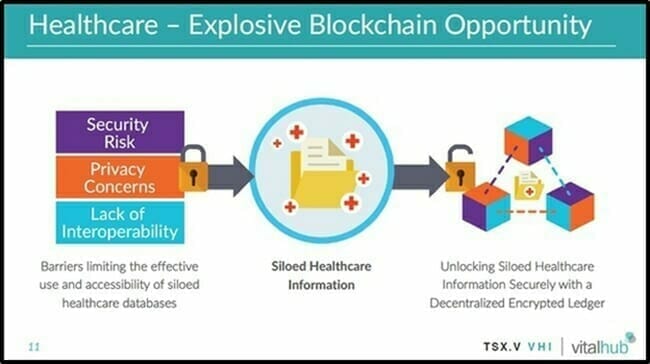“I will love the day when nobody talks about blockchain and they just talk about the value creation,” stated IBM Blockchain GM Marie Wieck at the Brainstorm Finance conference in Montauk, N.Y. last week.
Well said, Ms. Wieck. Let’s talk about value creation.
On July 17, 2019, VitalHub (VHI.V) – a company that utilises blockchain – announced the sale of its TREAT National Rehabilitation Reporting System (NRS) Module to St. Joseph’s Continuing Care Centre Sudbury.
TREAT is attacking a problem called Patient flow which is about monitoring “the movement of patients through a healthcare facility”. It involves physical resources, real-time data sharing, communication, coordination – from admission to discharge.
In North America, inefficient patient flow is attributed to an average $49,500 loss per bed, per year, with an average of 45 days lost per bed per year,” states VHI, “Some estimates have cited the current North American cost of inefficient patient flow to be $900 billion.”
Problems waiting to be solved:
- hospital gridlock
- poor care coordination
- low bed turnover
- low cost containment
- poor discharge planning
- high wait-times
- diagnostic miscommunications
- inefficient resource utilization.
The “Patient Flow Market” is crying out for innovation.
The existing status quo is so clunky and inefficient that – as well as draining billions of dollars from the medical system – it is causing thousands of deaths.
A recent Johns Hopkins study claims “more than 250,000 people in the U.S. die every year from medical errors, other reports claim the numbers to be as high as 440,000”.
To put this in perspective, every year 4 x more patients die from medical error than U.S. soldiers died in the entire Vietnam war. If you stacked up the body bags of patients who died inside hospitals though medical error every year, it would fill 3 Olympic swimming pools.
Astonishingly, medical errors are the 3rd leading cause of death after heart disease and cancer.
The authors of the Johns Hopkins report, define a death due to medical error as, “one that is caused by inadequately skilled staff, error in judgment or care or a system defect.”
“It’s the system more than the individuals that is to blame,” states the report, “Based on a total of 35.4 million hospitalizations, there was an incidence rate of 251,454 deaths per year — or about 9.5% of all deaths.
TREAT provides one holistic, integrated record to see, a full history of the client’s journey. This would include outcomes based on standardized assessments, case plans with integrated best-practice driven interventions, and a history of all the programs/services received, including external referrals.
TREAT automation features:
- scoring of assessment results
- auto-population of client-based issues
- case plan assessments
- Real time holistic data integration
- integrated best-practice guidelines
- library for goals and interventions
- workflow rules
- alerts, tasks, and edit checks
- Adaptable to unique workflow requirements.

The Ministry of Health asked St. Joseph to convert 75% of its 64 continuing care beds to rehabilitation beds. The hospital needed a solution that meets the “Canadian Institute for Health Information (CIHI) data standards for mandated electronic submissions”.
Following an evaluation of competitive solutions, VitalHub’s TREAT NRS Submission Module was chosen. The TREAT NRS Submission module will be deployed as a “Software As A Service” agreement and integrate with St. Joseph’s Continuing Care Centre’s primary Electronic Health Record.
We like “government-mandated-standards” as a demand driver.
VHI doesn’t need to knock on hospital doors, pitching its services. It waits for the hospitals to ask: “Can you help us comply with these government regulations?”
Current TREAT NRS Module clients:
- St. Joseph’s Continuing Care
- Northumberland Hills Hospital
- Ross Memorial Hospital Cardiovascular Rehabilitation Unit
- St. John’s Rehab Program at Sunnybrook
“While the majority of our Ontario TREAT customer have implemented our mental health offerings, it’s encouraging to note recent wins on our Rehabilitation solution as well,” stated Dan Matlow, the laser-focussed whirling dervish CEO of VitalHub.
Other healthcare tech products developed by VHI can be view here.
VHI’s robust two-pronged growth strategy, targets growth opportunities within its product suite while pursuing an aggressive M&A plan across the globe.

Ontario is now transitioning towards “value-based care models” – designed to improve efficiencies and lower costs across the healthcare system.
VitalHub’s patient flow technology will address the ‘hallway medicine’ issue, in support of the Ontario government initiative.
VHI Revenue for the three months ended March 31, 2019 was $2.4 million.
“When the system works well, patients flow like a river,” states Analytics Magazine, “When the system is broken, patients accumulate like a reservoir. Good patient flow means that patient queueing is minimized; poor patient flow means that patients suffer considerable queueing delays”.
The global patient flow solutions market is projected to reach US$2.53 billion by 2025, growing at a CAGR of 21.32% from 2017 to 2025. (Verified Market Research, August 2018).
“We are pleased to be partnering with VitalHub to ensure the rehabilitation we are providing to our patients is captured in an efficient and effective manner,” stated Jo-Anne Palkovits, President & CEO, St. Joseph’s Health Centre.
That’s called value creation.
Full Disclosure: VitalHub in an Equity Guru marketing client.


Leave a Reply